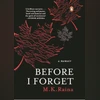Before I Forget: A Memoir
Author: M K Raina
Publisher: Penguin Vintage
Pages: 409
Price: Rs 999
MK Raina (75) has produced over 130 plays such as Kabira Khada Bazaar Mein, Karmawali, Lower Depths and Pari Kukh, in several languages. He has acted in over a 100 of them since he passed out of the National School of Drama in 1970. As a movie actor, his filmography stretches over the years from the National Award winning 27 Down (1974) to the brilliant Ek Ruka Hua Faisla (1986), Taare Zameen Par (2007) and lately Gangubai Kathiawadi (2022). It includes shows such as Tanaav, the Indian adaptation of Fauda, on SonyLIV.
However, Before I Forget: A Memoir hardly has a mention of the breadth and depth of his theatre and film work. In fact, you would be hard-pressed to figure out what precisely he does for a living if you read the book without any context of the man. But once you start reading it, it doesn’t matter. Before I Forget is a picturesque amble through the life of a gentle, kind-hearted man who happens to be an actor. He is more a socio-cultural activist who believes strongly in using art, in his case performing art, as a way of dealing with societal issues. For many decades now, he has used his understanding of the craft, his position and the ecosystem in which he operates to get people together, to heal wounds, to help. Nowhere in the book does Mr Raina say this directly. The book simply takes you through vignettes of his life.
If you have seen him in a play or a movie, you realise he writes as he talks, gently, unhurriedly. He starts with his childhood in Kashmir in the 1950s and 1960s. It was a different India; one that was just getting stitched into a country. He can now put into perspective some of the events he heard about or saw — the arrest of Sheikh Abdullah by the Indian government, his return, the popular support he had among Kashmiris. He describes in great detail the hours people waited and the sea of humanity that ran behind Abdullah’s car in downtown Srinagar when he was released from prison in April 1964.
Mr Raina was acting in school plays from early on. Dinanath Nadim, the principal of his school in Srinagar, was a legendary name in Kashmiri literature. After independence in 1947 there was talk of Naya Kashmir and one of its pillars was art and culture. This inspired a progressive cultural movement in writing, performing arts et al. In the first-ever Festival of Kashmir in 1956, Mr Raina, then all of eight years old, was part of Neki Badi, a musical opera written by Nadim.
Mr Raina’s childhood and the Kashmir he describes is rich with the imagery that only someone who has grown up in the state before the strife began could possibly capture. When he is describing a situation, such as his grandmother’s funeral or how people helped him home during a sudden curfew, it seems like another world with people from across professions and religions playing, socialising, and standing up for one another.
He is clearly a good observer, both as a child and as an adult, and humanitarian to core. That explains why the book is more focused on political, social and cultural events, and what he did at that time instead of just the plays or films in which he worked. When the book moves to Delhi, Mr Raina describes his experience of the onset of the 1984 riots, the work he and fellow actors and writers did for the victims. There are pages upon pages of what happened, how bad things were at relief camps, how it was tough to get things organised. Remember, this was India in 1984. There was no decent public or private transport, phones were few and there was no mobile or internet.
Similarly the work he and his colleagues did when Safdar Hashmi, a friend, poet, playwright and actor, was killed while performing a street play in Delhi in January 1989 is evocative. Their grief led to the forming of SAHMAT or the Safdar Hashmi Memorial Trust in February of that year. Its purpose is to stand up for creative freedom and the democratic rights of the cultural community in India. There are stories of plays performed, workshops done in Kashmir (among other places) in the shadow of militancy.
For some reason, maybe a hankering for a simpler time, Mr Raina’s stories, anecdotes and the people he talks about touched me. His writing is easy, free-flowing. He is not trying to impress, surprise or shock. He is just telling you about various things that happened in his life, before he forgets. Read it for the joy of discovering this gentle man and an India that is now forgotten.
Unlock 30+ premium stories daily hand-picked by our editors, across devices on browser and app.
Pick your 5 favourite companies, get a daily email with all news updates on them.
Full access to our intuitive epaper - clip, save, share articles from any device; newspaper archives from 2006.
Preferential invites to Business Standard events.
Curated newsletters on markets, personal finance, policy & politics, start-ups, technology, and more.
)